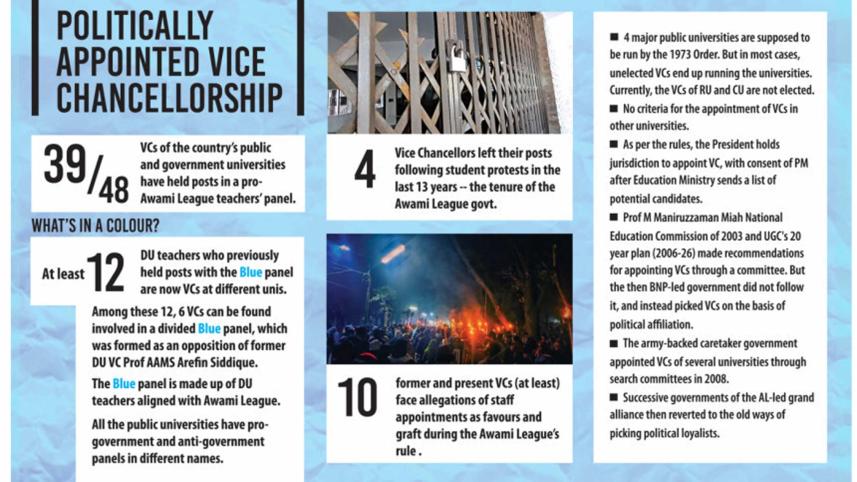A VC should rise above petty politics

A nation looks up to the vice-chancellor (VC) of a university as the personification of higher virtues, knowledge, and wisdom. It is commonly expected that he or she would endeavour to turn their institution into an ideal academic and administrative hub rising above petty political interests, personal liking and disliking. Unfortunately, in recent years, we have seen how many public university VCs have failed to do so, their tenures marked by irregularities and controversies leading to the loss of their credibility. Such irregularities often range from favouritism, nepotism in recruitments, financial misappropriation, arbitrary decisions on matters of campus discipline, indecent remarks, etc.
According to an investigative report by this daily, although there are no specific rules for the appointment of VCs in our public universities, a VC is mostly selected from a pro-government teacher's panel. With years of activism in support of the government of the day, this system of recruitment often makes many VCs impudent enough to overlook rules and regulations and overstep the ethical bounds. The report found that at least 39 out of 48 VCs of public universities have previously held posts in different pro-government teachers' wings. Of them, at least 12 teachers who were directly involved with the AL-backed Blue panel of Dhaka University are now VCs of different universities.
It is also a matter of great concern that a PhD degree, once a mandatory requirement for being a professor, now appears optional for those with political affiliations. For example, the VCs of Shahjalal University of Science and Technology (SUST) and Bangladesh University of Textiles (BUTEX) do not have a PhD degree. Besides, none of the VCs with a PhD degree obtained it from the United States, which has the most well-recognised universities in the world. Clearly, their political affiliations triumphed over their qualifications as a teacher and even past records of irregularities.
People expect a VC to lead from the front and bring about qualitative change in the academic and administrative environment of a university. A VC can either take an institute to the zenith of excellence or to the abyss of failure—and the current trend shows we are heading in the latter direction. This is an outcome that is desirable neither for the country nor for the powers that be. We urge the authorities to leave academic matters to the academics and allow our universities to truly serve the nation through proper direction and able, nonpartisan leadership.



 For all latest news, follow The Daily Star's Google News channel.
For all latest news, follow The Daily Star's Google News channel.
Comments